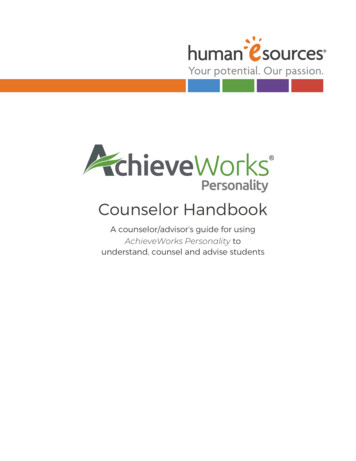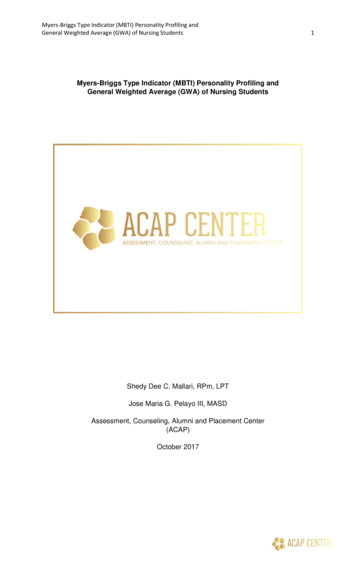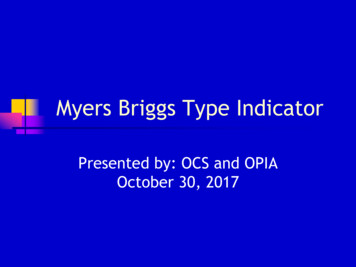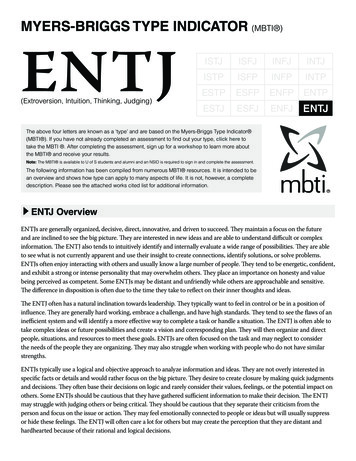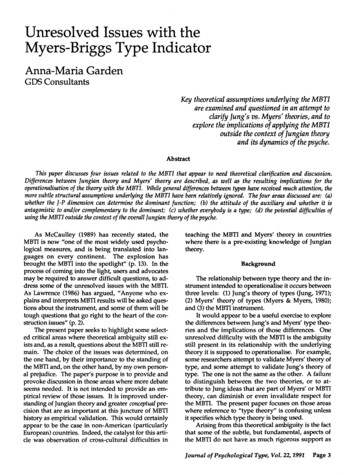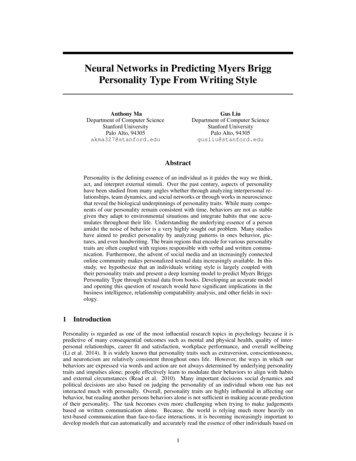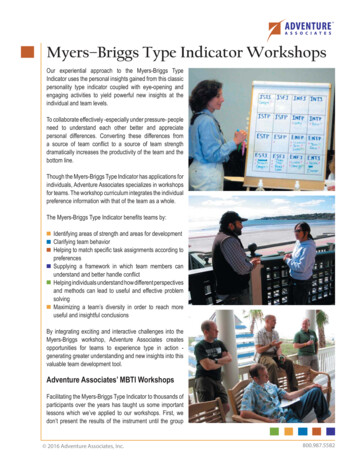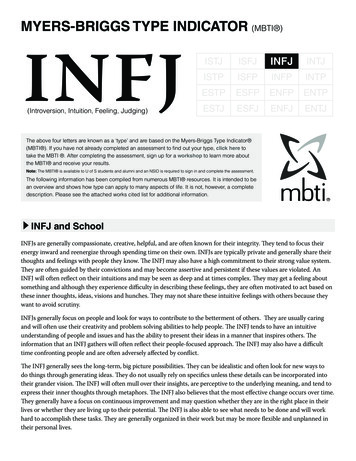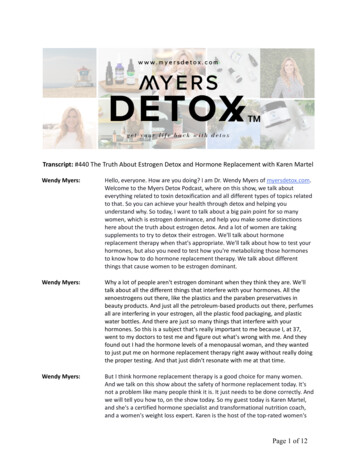
Transcription
Transcript: #440 The Truth About Estrogen Detox and Hormone Replacement with Karen MartelWendy Myers:Hello, everyone. How are you doing? I am Dr. Wendy Myers of myersdetox.com.Welcome to the Myers Detox Podcast, where on this show, we talk abouteverything related to toxin detoxification and all different types of topics relatedto that. So you can achieve your health through detox and helping youunderstand why. So today, I want to talk about a big pain point for so manywomen, which is estrogen dominance, and help you make some distinctionshere about the truth about estrogen detox. And a lot of women are takingsupplements to try to detox their estrogen. We'll talk about hormonereplacement therapy when that's appropriate. We'll talk about how to test yourhormones, but also you need to test how you're metabolizing those hormonesto know how to do hormone replacement therapy. We talk about differentthings that cause women to be estrogen dominant.Wendy Myers:Why a lot of people aren't estrogen dominant when they think they are. We'lltalk about all the different things that interfere with your hormones. All thexenoestrogens out there, like the plastics and the paraben preservatives inbeauty products. And just all the petroleum-based products out there, perfumesall are interfering in your estrogen, all the plastic food packaging, and plasticwater bottles. And there are just so many things that interfere with yourhormones. So this is a subject that's really important to me because I, at 37,went to my doctors to test me and figure out what's wrong with me. And theyfound out I had the hormone levels of a menopausal woman, and they wantedto just put me on hormone replacement therapy right away without really doingthe proper testing. And that just didn't resonate with me at that time.Wendy Myers:But I think hormone replacement therapy is a good choice for many women.And we talk on this show about the safety of hormone replacement today. It'snot a problem like many people think it is. It just needs to be done correctly. Andwe will tell you how to, on the show today. So my guest today is Karen Martel,and she's a certified hormone specialist and transformational nutrition coach,and a women's weight loss expert. Karen is the host of the top-rated women'sPage 1 of 12
health podcast, The Other Side of Weight Loss, where she helps women tounlock the mysteries of female fat loss in hormone imbalance. So afterstruggling with her own health issues, Karen was determined to bring herknowledge to others with a bold new approach to women's hormone health andweight management. Karen's passion lies in helping women balance andoptimize their hormones in para and post-menopause and breakthrough weightloss resistance. You can learn more about Karen and her work atkarenmartel.com. Karen, thank you so much for coming to the show.Karen Martel:I'm pretty excited to be here Wendy, back for a second time.Wendy Myers:Yes. You've been on before so I encourage you guys-Karen Martel:A long time ago.Wendy Myers:Yes. I encourage you guys to go check that one out on weight loss. And so whydon't you tell us a little bit about your story and how you got into the healthsphere?Karen Martel:Yeah, so I got into hormones because my own hormone issues have always beenreally bad. Of course, with my first daughter, which I think so many women canrelate to, after they have kids, suddenly their body is just not the same anymore.And I was doing everything right as far as exercise, eating well, I've always eatenreally well and taken care of my system, and I was done breastfeeding, and I justsuddenly started to gain weight, and it wouldn't stop. I just kept getting fatterand fatter and fatter, and I hadn't changed anything. I did what every womandoes, and I went out and tried every diet at the time that was out there, Atkins,The Zone. I think I did juice, cleanses, and detox; you name it, I tried it and keptgaining weight.Karen Martel:Got the personal trainer, went to the gym, and started doing a CrossFit-typeworkout. Six days a week, I still kept gaining weight. And I was 33 at this time. Sonobody at that time would've said that to me. I went to my doctor. She didn'tsay, oh, it could be your hormones. She said, "Here's your antidepressant."Because my PMS was so bad and I was getting insomnia. And so she's like,"Here's your antidepressant, here's your sleeping pills. Basically, see you laterand it was of no help. So I just kept gaining weight, having all these other healthissues arise. I was getting chronic migraines, digestive issues, like I said, reallysevere PMS to the point that it was PMDD. And I finally was like, there's got tobe something else going on because I'm doing everything right.Karen Martel:I'm watching my calories. I'm exercising harder than I've ever exercised in mylife, so what's happening? And I ended up going to a friend of mine who was anaturopath and asked him to test my hormones for me. And sure enough, itcame back that I had all of these hormone imbalances. My cortisol was tanked,and my DHEA was tanked. My estrogen was high, and my progesterone was low.And then, a few years later, I actually also found out that I was hypothyroid. So IPage 2 of 12
think that was also triggered by the pregnancy and the stress of being a singlemom and running my own business at the time.Wendy Myers:Yeah, I had the same things-Karen Martel:Did you?Wendy Myers:I had the exact same, exactly what you just said after I had my daughter Winterabout 12 years ago. Same thing about a year later. I just kaputt.Karen Martel:Yes, yes. Wendy, looking back at it now, because I've done so much research andtesting on myself, I later found out that I was riddled with mercury and lead. Astop of the charts could go, mine was. And I think, and this is my theory, and youcan see if you can tell me because you're the expert on this. During pregnancy,your bones soften, and you hold a lot of lead in your bones. That's where youstore it. So my theory was maybe it was released. The lead was released throughthat pregnancy, which started to hamper my hormones because lead andmercury, we know, really affect the hormones. And so I wasn't converting my T4to T3. My reverse T3 was too high. And I think a lot of it stemmed from thoseheavy metals and the stress of pregnancy, the nutrient deficiency that happenswith pregnancy.Karen Martel:I mean, they say it now takes something like four years between pregnanciesjust to refill our vitamin stores because we're so nutrient deficient right now. So Ijust think I had this perfect storm of possibly heavy metals going up in mysystem, affecting the thyroid, the stress of everything, the nutrient deficiency.And it was just this. It was crazy. And I was the heaviest I'd ever been, in theworst health I'd ever been, even though it was probably the best I was evereating and the most I'd ever worked out.Wendy Myers:Yeah. I had the same exact experience. I was working out six to eight hours aweek, but I had trouble sleeping and eating so healthy. And I was just like, Iwould be an Olympic athlete if I was doing this in my twenties.Karen Martel:Totally.Wendy Myers:I'm like, what is going on? Yeah. It's very frustrating when you work that hard onyour health, and you feel like you're a hamster and a wheel.Karen Martel:Yeah.Wendy Myers:And so, let's talk about hormones. A big problem is estrogen dominance. It's abig problem, and it's very confusing. So what is this, and what can we be doingto address it?Karen Martel:Yeah. Estrogen has a bad name. It's got a bad rap to it. Everybody thinks that it'sa terrible hormone, that it's going to make you fat. I have over 400 blog posts onPage 3 of 12
my website right now, Wendy. And the most visited blog is one on estrogendominance. And I will tell you right now, every single woman thinks that she isestrogen dominant. Whether she's in fertile years or perimenopausal years,everybody thinks they're estrogen dominant because of the list of symptoms.They say, oh, fat gain in the belly and hips. Oh, that's me. Oh, I have bad PMS.That's me. That's something that's so common, both of those things right now.So they look it up, they Google it. They say, okay, it's estrogen dominance. Andeverybody's on these supplements to help clear out this estrogen. And it's justnot that simple.Karen Martel:And estrogen is not the devil. We really want estrogen, which can actually be aweight loss hormone, and many women don't know that. The issue is it canhappen at different levels, and a lot of it is xenoestrogen dominance. We knowthat, and I'm sure you've talked lots about this on your podcast, is ourenvironment is full of these xenoestrogens, which are so toxic. And what a lot ofpeople don't know is that your body on the inside will take the xenoestrogeninto the cells before it takes your estrogen into the cells.Wendy Myers:Yeah and they mimic-Karen Martel:It's Stronger.Wendy Myers:Yeah, and xenoestrogens mimic estrogen. Your body can't tell the difference.Karen Martel:No, and it's stronger. So it's going to sit on the receptors for those that don'tknow what that is. I kind of think of the receptors, this little hand that's comingoff of a cell and grabbing the hormone to bring it into the cell. So we havedifferent receptors when it comes to estrogen. We've got two main receptors,the alpha, and the beta receptor. Alpha being the stronger one, beta being themore softer one. So xenoestrogens, your receptor will pull onto that alphareceptor before it pulls into yours. So we get xenoestrogen dominant, which youcan't test for that. UnfortunatelyWendy Myers:Yeah, a test, you end up testing low for estrogen.Karen Martel:Yes.Wendy Myers:Because you have all these xenoestrogens floating around, your bodydown-regulates the production of our real estrogen. And then it shows low ontests, and you think, oh, I need more estrogen or whatever. But for me, I knowthat I had symptoms of too much estrogen, but my estrogen levels were thelevels of a menopausal woman at 37. So it makes it super confusing to figure outwhat to do.Karen Martel:Very confusing. And what we tend to see is in our 40s and early 50s, estrogenstarts to go down. And a lot of doctors and a lot of functional doctors are puttingwomen on things like Diindolylmethane and saying, "Okay, you gotta take thisPage 4 of 12
and clear out your estrogen dominance." And the thing with DIM is it will drainyour estrogen. And so yes, there are these three different pathways thatestrogen can go down. There are ones that are better than others. There's the2OH which is the safer pathway. There's the 4OH, which is more toxic. And thenthe 16OH. And this can lead to both of these pathways. If there is too much inthem it can lead to DNA damage and is more linked to this estrogen-attachedpathway, but not enough into 2OH. And so they put women on DIM.Karen Martel:Well, if you're perimenopausal or menopausal, that's going to get rid of theestrogen as well. Yes, it's going to push it down that safe pathway for your bodyto detox better. But it can also get rid of the estrogen. Taking DIM andCalcium-D-Glucarate is going to be fantastic. Supporting your liver detox is goingto be great, but you want to test, and you want to see you have normal levels ofestrogen, but you're not breaking it down in the right path within the liver? Is itnot going through phase one or phase two? You have to look at all of thesethings before you just jump on these supplements. Because if you start to tankthe estrogen, you're going to run into a lot of problems as you're getting older,and you're actually going to get more symptoms and weight gain if you start todrain the estrogen by taking these supplements.Wendy Myers:So a lot of women taking DIM, they think they're taking it, or they need it to helpto break down toxic estrogens and help the liver process and metabolize theseestrogens. But there are a lot of downsides too. You have to be careful. Youdon't want to DIY this and do it yourself. And we see a lot of health issues likehigh cholesterol, insulin resistance, dementia, Alzheimer's, fatty liver, candida,UTIs, and osteoporosis that arise in women as they go through pre andpost-menopause. So why is that?Karen Martel:We've got estrogen receptors on every organ in our body, on every cell in ourbody, including immune cells. We're full of estrogen receptors in our brain, ourliver, and our pancreas. So what does this mean? It means that when you loseyour estrogen, all of these organs are going to suffer to some extent because ofthe lack of estrogen. So this is where people are so afraid of estrogen. It's gotthis horrible bad rap, but yet it is like the mother of all hormones. And withoutit, you literally start dying because it's so crucial to every function in your body.So without estrogen, we see women's cholesterol going up without havingchanged anything in their diet. We'll see them develop non-alcoholic fatty liverdisease. We see them becoming type two diabetic. It's a real thing where ourrisk for type two diabetes goes up as we hit perimenopause and menopause.Karen Martel:And almost all of us are going to have some degree of blood sugar dysregulationbecause of that lack of estrogen. Estrogen helps you to become more insulinsensitive. So when you don't have it, that's why your blood sugar can suddenlygo up. That's why your hemoglobin A1C can go up, and you suddenly becomeinsulin resistant. We can become leptin resistant, so now we're eating more. Thebody is so smart. It's going to start to put fat on your body because you canmake a type of estrogen called estrone out of fat cells. So your body's going toPage 5 of 12
put fat primarily in your belly, which is then going to also make you more proneto insulin resistance. And then estrone is this inflammatory estrogen. It still hasits good to it, but too much of it is going to make you even fatter, and more fat isgoing to lead to more estrone.Wendy Myers:I love how the body's innately intelligent and it put more fat on-Karen Martel:Oh.Wendy Myers:On us to make estrogen.Karen Martel:It's so true.Wendy Myers:I'm being totally sarcastic, but I'm like, why? This is why women they go intomenopause. They gain 10, 15 pounds. And it's just so their body makes estrogen.So there's a way to circumvent this kind of almost inevitable kind of side effectof going into menopause.Karen Martel:Yeah. And so, so many women don't realize that we're actually healthier and it'ssafer for us to replace estrogen than not replace estrogen. And so a lot of thebad information comes from old estrogen, Premarin, which came from pregnanthorses. We would take it orally, which would increase your risk of heart attackand stroke. Well, transdermal estrogen doesn't increase your risk of heart attackand stroke. So there's a lot of crossovers where they're putting the Premarinstuff with our bio-identical estrogen replacement therapy. And there was a studythat came out last year or the year before in Arizona that showed that womenwho replaced their estrogen for six years or longer in menopause had a 75%decrease in getting Alzheimer's or dementia. So that's huge, considering there'sno fix for it. There's no cure for Alzheimer's disease.Karen Martel:So that in and of itself is crazy. So everything shows that when you replace theestrogen with bioidentical transdermal estrogen, you will have less risk ofdeveloping diabetes, liver disease, high cholesterol, heart disease, and evenbreast cancer, which a lot of women think that taking the estrogen is going togive them breast cancer. And we see breast cancer predominantly inmenopausal women after they lose their estrogen. And even some of the largestudies showed even on Premarin that there was a decreased risk of breastcancer. And it was the progestin in old HRT, which was fake progesterone, thatincreased women's risk. And so, women will take birth control pills without aproblem. Yet, they're afraid to take bioidenticals, which is exactly the same asyour body's estrogen therapy transdermally.Wendy Myers:So yeah, so I'm all for hormone replacement therapy. I think it makes womenfeel better. They're more juicy; they lose weight or can lose weight as a result ofit, they have better mental health, their whole body works better, and they havereduced bone loss. When you start losing that estrogen, you start having higherbone cell turnover. You can lose bone mass. So there are just so many benefits toPage 6 of 12
taking it. So it's something worth considering but needs to be done correctlywith a doctor who's trained in that. You have to test consistently for yourhormones, make sure you tweak them correctly, and you want to doKaren Martel:Yeah. And make sure you prepare your body for it. That's where so many peoplego wrong is they'll go to a hormone clinic or their doctor, their medical doctor,and say, "I want to start HRT." Even if it's bioidentical hormones, for somewomen, that's all they need to do. It's like throwing it at them, they do fantastic,and that's it. But there's a large percentage of women who come into it thinkingit's going to be this quick fix. And they haven't prepared their body. They're stilldrinking all the time. They might be overweight. They haven't looked at theirdetoxification pathways. They don't know genetically how they process estrogenand its androgens. You really have to put all these puzzle pieces together. Ifyou're highly stressed out, don't have good gut health, or don't have a goodliver, all of these things will affect how your body will take on those hormones.Karen Martel:It's going to affect you, even when you're younger, how you're dealing with yourhormones. But as you age, these things become much more important becausenow we're relying on things like the adrenal system to produce a little of ourhormones. We are relying on these bioidentical, outside hormones coming in togive us what we need. But if we still have a ton of xenoestrogens, we're stilloverweight, we've got diabetes already, or whatever it might be, healthproblems. You're drinking wine every single night. Well, guess what? You'regoing to start estrogen, and guess what? You're not going to feel very good.You're going to have tender breasts, you might have some weight gain, andyou're going to go, forget it, I'm not going to go on estrogen. It's the devil.Karen Martel:When it's the fact that you didn't prepare your body for those hormones. Andnowadays, we really, really have to prepare the body for hormones. We have tomake sure that we have everything in place, that we have good blood sugar, andthat we're taking progesterone with it in the right way. That if you needtestosterone, you're going to get testosterone as well. All of these things worksynergistically together, and you have to look at the entire picture to benefitfrom those bioidentical hormones.Wendy Myers:Yeah. I'm glad you brought that up because no one has ever mentioned that onthe show before. And that's such a good point because there are so many thingsthat can kind of displace our hormones or interfere with our hormones. They'rebeing metabolized properly and processed properly and utilized. So that's areally good point, but how can we find out how we're processing our hormonesproperly? That's something that's so key, and I think a lot of doctors probablyaren't looking at that stuff.Karen Martel:No, they're really not. I just saw a hormone person here in Canada because Ineeded to get on testosterone. So I needed somebody that could prescribe thatbecause it's very hard to get testosterone for women. So she's a nursepractitioner, and sure enough, she just. "Here's all the blood work that you havePage 7 of 12
to get beforehand." And I thought, ah, isn't that interesting? She has no ideaeven how to interpret a urine metabolite test. And it is so important to see howyou break down hormones before you go on them. So the best thing is theDUTCH urine metabolite test. This is going to tell you how you break down yourcortisol, how you break down your progesterone, your estrogens, and yourandrogens, which is really important because there are two different pathways.Once again, alpha and beta with your testosterone and your DHEA a and one ofthem, I just had woman yesterday whose DUTCH test showed that she was wayon the side of what's called the 5-alpha reductase pathway, which is just how isshe breaking down her androgens?Karen Martel:And when you lean towards that alpha side, it means that she's going to besomebody that if she goes on testosterone therapy, she could get facial hair, shecould get really oily skin, she could lose her head hair because she's moreandrogenic and she's going to be converting more of her androgens downwhat's called the dihydrotestosterone pathway. And so you want to see whatthat looks like? How is she breaking these hormones down? And then with theestrogens, you want to see those three metabolites. How are you breaking themdown in that phase one? And then also how are you methylating andglucuronidation as well as that end piece. Because you can take certain thingsthat are going to help with each of these pathways. So if you're leaning towardsthat 5-alpha reductase pathway with your testosterone, you can take things likesaw palmetto and nettle that will help your body lean more towards the betaside.Karen Martel:If your phase one is having some problems with your estrogen, then you couldtake a little bit of DIM, no more than 100 milligrams, because that is actuallygoing to block your androgen receptors. So you can actually lose testosterone ifyou take too much DIM. Most people don't know that. So take a little bit of DIM,take some phase one, some liver stuff. And then, if it's your phase two, you wantto take stuff that's going to help you methylate, that's going to help you break itdown in your gut. Are you pooping okay to help with getting rid of it completely.So seeing all these pathways before you start your estrogen replacement is key.Karen Martel:For myself, I have problems oxidizing. I have problems with my glutathionepathway. So I have just taken N-acetyl cysteine. I have to watch my markers. I'vegot to take things like curcumin, things that are high in antioxidants, to help withmy estrogen replacement and help my body to break it down because those arethe pathways that I have troubles with. And that's from my DUTCH and my DNAtests that I know that. So having those things in place before you start is key.Wendy Myers:Yeah. And that's so much more rigorous than just finding out what your levelsare.Karen Martel:Yes.Page 8 of 12
Wendy Myers:I mean, that's what most doctors are. Let's just check what the level is in theblood. And it's just not enough these days. I mean, people need to do betterthan that that are doing hormone replacement therapy, for sure.Karen Martel:Yeah. If you're in menopause and you've been in there for a while, so that meansyou haven't had a period for over a year, blood work, it's going to be accurate inthe sense of, it's going to show you if you don't have any of these hormones,which you likely don't. And then, if you start that hormone replacement, youwould do the DUTCH test a period of time after starting the hormones, just tosee how you are breaking those hormones down. But if you're in menopauseand you just don't have any hormones, which is very common, then you're notgoing to see much on that DUTCH test because you've got nothing to actuallybreak down. So we can't see how those pathways look.Karen Martel:So, in that case, the serum is okay, but if you're a fertile woman or you're inperimenopause, you really want to do either DUTCH test, especially if you'regoing to start the hormones and you're really trying to see the big picture, or ifyou're younger, you can get away with doing saliva tests, and that's going to testwhat's available for your hormones as far as free levels of hormones. And it'sway more accurate than serum at that time in your life.Wendy Myers:Yeah. Very good distinctions there. That's why I love to do this show to helppeople make those distinctions that make all the difference in the efforts they'remaking to try to improve their health. So let's talk about detoxification, the roleit plays in helping balance your hormones and maximize your hormones, andwhy it needs to be a part of your health regimen in pre and post-menopause.Karen Martel:Yeah, I think because women will say, oh, but it's so natural for us to go throughperimenopause, it's natural for a woman to go into menopause, but it's notnatural to have all of the toxic loads that we now have in our environment. Sowe are not going through perimenopause like we used to even 50 years ago.We're seeing women; it's just starting earlier, and earlier typically, women willstart to go into perimenopause between 35 and 40 now, and then it's going tolast like 10 to 12 years. And if you've got a rough time with your perimenopausesymptoms, which can be absolutely brutal for some women, it makes womenwant to commit suicide. I'm not even joking. There are so many women outthere who get so depressed with the lack of hormones that they getanxiety-ridden.Karen Martel:It's absolutely off; this can last for 10 to 12 years. So we have to take intoaccount detoxification. It's in every single one of my programs. I make mymembers in my membership group, four times a year, we're doing detoxes thathave to do with the liver. I'm telling them all that they can't drink like they usedto, which is huge because if you're drinking alcohol every night, your liver thenhas to process the alcohol first before it processes your hormones. So thehormones will get recirculated into the system, and then you can get estrogendominance. Your body won't be able to be detoxing these horriblePage 9 of 12
xenoestrogens out of the liver. So liver detoxification has to be part of growingolder, I think. And I think it should be part of every adult through your entireadulthood, but ever more so for us, women that are going throughperimenopause, we have got to take care of these detox pathways.Karen Martel:Because if not, then you run the risk of not processing that estrogen properly.That those estrogen metabolites start to go up, that you start recirculating thisestrogen, and then that's not good. Estrogen is a growth hormone. So if you dohave, for instance, breast cancer cells in your breast, well, guess what,estrogen's going to go there thinking it's going to go do its job, which is to helplower inflammation. It's going to go there because it's a growth hormone. It canmake those cells grow and multiply. So we want to ensure that we're able to getrid of these estrogens after our body uses them and that we have really goodreceptor health. We want to have that even between alpha and beta estrogenreceptors because of too much alpha from those xenoestrogens and fromestrone.Karen Martel:So estrone, the more toxic estrogen we make in our fat cells, will upregulate thealpha receptors 65% more than the beta. So if you've got too much going downthose pathways, you're going to become this estrogen dominant, and you'regoing to be gaining weight, and you're not going to be feeling very well. So youneed to even these things out, and there's so much you can do, like justcruciferous vegetables, which we all know is super healthy for us. It's really goodfor the estrogens. Things like flaxseeds. Flaxseeds are the highest inphytoestrogens, but they will occupy those beta receptors. So it's going to giveyou the softer estrogen, the safer one. Taking progesterone is going to helpsoften the estrogen. And it's going to actually help with estrogen beta receptorsand downregulate the alpha receptors. So all of this is so important, but youhave to see how you are detoxing?Karen Martel:So going back again to whether you get your DNA report, you get a DUTCH testwhere you can see how you are breaking these things down. Even though bloodwork, get all of your liver enzymes tested, get your cholesterol done, and getyour blood sugar done because it will help get rid of that estrogen, includingwhat's going on in your gut. So do gut tests because you need to be able todetox it through your guts. You need to be able to chop up that estrogen and getit out.Wendy Myers:Yeah. And, so do you have a program or work one-on-one with people to helpthem with balancing the hormones?Karen Martel:Yeah. So I take, what we just talked about today, and that's what I look at. One ofmy packages, for instance, to work with me, includes the DUTCH test. And thenit includes a program that's going to walk you through each of these areas thatyou've got to make sure that you've got dialed in. So we've got an entire sectionon liver detoxification, all the different pathways that you need to be looking at,what you can take to help support the liver health, plus a gut one, plus one onPage 10 of 12
your estrobolome, which is the gut bacteria that helps to break down estrogen.So it ends stress and all of these things. It brings you through each of thesepuzzle pieces so that you can make sure that you sail through this time in yourlife, through perimenopause to menopause, as best you possibly can, becausethis can be the best time in a woman's life.Karen Martel:But because we're not getting the information, you can't get it from your doctor.Your doctor's not trained in menopause. Most doctors have no clue. Evenfunctional doctors are lacking in a lot of the information unless that's whatthey've decided to go into. Most of them really, they're trained very little inbioidentical hormones, in this how does your body process them, which youhave to look at. So you really want to see all of this in the big picture. So I've gotthat, and I do one on ones there. And then I've got a membership group that I'vebeen running for five years now that takes women through this program. Andwe do live coaching sessions, and it takes them through each of these modulesthat helps their body to prepare for the hormones if they so choose
They say, oh, fat gain in the belly and hips. Oh, that's me. Oh, I have bad PMS. That's me. That's something that's so common, both of those things right now. So they look it up, they Google it. They say, okay, it's estrogen dominance. And everybody's on these supplements to help clear out this estrogen. And it's just not that simple.



